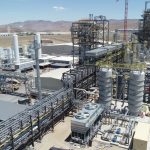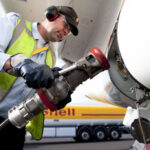The Australian government has accelerated plans to decarbonise the nation’s air transport sector, formally launching the Australian Jet Zero Council and also announcing a AUD$30 million ($20m) funding programme to support local production of sustainable aviation fuels. The Jet Zero Council will focus on end-to-end development of SAF, from production to distribution, and additional measures to reduce emissions and increase aviation fuel security. The Australian Renewable Energy Agency (ARENA) will coordinate the SAF funding initiative, which specifies new fuels must be produced using locally-sourced renewable feedstocks. Power-to-liquids and e-fuel pathways are specifically excluded from the programme. Meanwhile, Virgin Australia and Boeing have formed a new sustainability partnership to push for the development of an Australian SAF industry.
“For a country so reliant on aviation for passenger and freight transport it’s essential that we find ways to reduce emissions from this critical sector,” said ARENA CEO Darren Miller. “With abundant agriculture, waste and residue resources, Australia has the potential to support a thriving domestic biofuel industry.”
The two initiatives are in response to strong lobbying of the current and previous governments by the aviation industry to help kickstart local production of renewable aviation fuel and the use of domestically-abundant feedstocks, much of which are currently exported for offshore production of renewable fuels.
They also follow commitments by both Qantas and Regional Express (REX) to invest in sustainable aviation ventures, and a partnership between Virgin Australia and Boeing to help advance SAF production.
The 14-member Jet Zero Council includes representatives of the three airlines, plus Airbus and Boeing, Brisbane Airport, the Regional Aviation Association of Australia, the Department of Defence and the fuel industry, plus federal government finance, investment, research and development agencies.
The body will be chaired by Catherine King, the federal Minister for Infrastructure, Transport, Regional Development and Local Government, and modelled on the UK’s Jet Zero Council. As well as driving industry efforts to decarbonise aviation, the new council’s work will complement the government’s Aviation White Paper, currently being developed to guide the industry’s next phase of growth and development.
The funding initiative announced by ARENA, which is also one of the founding members of the Jet Zero Council, is offering funding of between AUD $1 million ($670,000) and $30 million ($20m) for commercial or pre-commercial SAF production, focused on engineering feasibility and project development activities or supporting pilot scale demonstrations.
The agency said it would also seek proposals with “novel and scalable approaches across the supply chain”, including innovation in feedstock supply such as aggregation or business models which supported domestic production of SAF.
ARENA’s Miller said the initiative served the dual purpose of leveraging natural advantages to reduce aviation’s emissions and maximising the economic opportunities of feedstock and fuel development. The agency’s Bioenergy Roadmap identified SAF produced from renewable biomass could produce up to 19% of Australia’s aviation sector fuel needs by 2030, as part of a broader AUD $10 billion contribution of bioenergy projects to the national GDP.
“Although Australia currently lacks local production of SAF, it possesses significant potential in renewable feedstocks that could be harnessed to meet both domestic and global SAF supply needs,” ARENA explained.
“Proposals will be required to demonstrate that they use or process and eligible renewable feedstock and production pathway. Power-to-liquid or e-fuel production pathways are not supported under the funding initiative.”
The formation of the Jet Zero Council and the announcement by ARENA of the sustainable aviation funding programme closely follow a AUD$400 million ($267m) commitment by Qantas to establish a dedicated investment vehicle to support sustainable projects and technologies – a fund which the company claims to be the largest created by any airline.
The Qantas Group, which includes Qantas International, Qantas Domestic, Qantas Freight and the low-cost carrier Jetstar, has long called for a local SAF production industry, and last year partnered with ANZ Bank and Japanese energy group Inpex Corporation in Western Australia’s Wheatbelt Region in a project to evaluate both reforestation and decarbonisation using drought-resilient native trees, and the use of native biomass crops and agricultural waste residues as feedstocks for renewable biofuels. The first planting of native trees is expected to occur this year.
Together with Airbus and the Queensland state government, Qantas is also investing in a new alcohol-to-jet production facility planned by the bioenergy company Jet Zero Australia and the US-based energy technology group LanzaJet, which will process locally-sourced agricultural waste including sugarcane to produce up to 100 million litres of SAF per year.
Meanwhile, Virgin Australia and Boeing have committed to a new sustainability partnership through which they will “prioritise joint advocacy” for the development of an Australian SAF industry, and work together to advance carbon offsets in Australia that support regional development, particularly in indigenous communities. Their commitment came as the airline added the first of eight new Boeing 737 MAX8 jets to its fleet, which was part-powered by a 30% blend of SAF on its delivery flight to Australia.
Photo: Virgin Australia













More News & Features
SAF One announces new investment and technology partners for Middle East SAF project
New initiative formed to accelerate SAF adoption and production in the Pacific Northwest
EcoCeres opens new Malaysia production facility as SAF ambition in Asia scales up
Aviation, shipping and fuel leaders convene in Rotterdam to accelerate sustainable fuels scale-up
EU SAF mandates will have to be revised, predicts French oil chief
Lessons learned from the collapse of Fulcrum BioEnergy